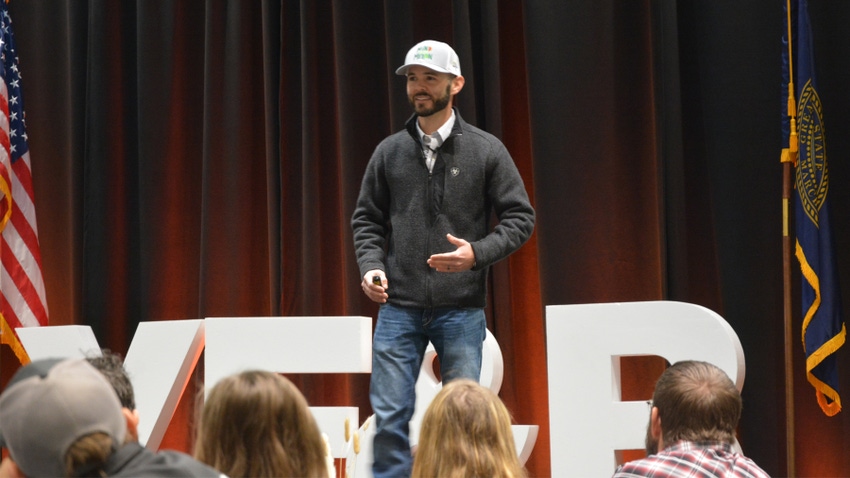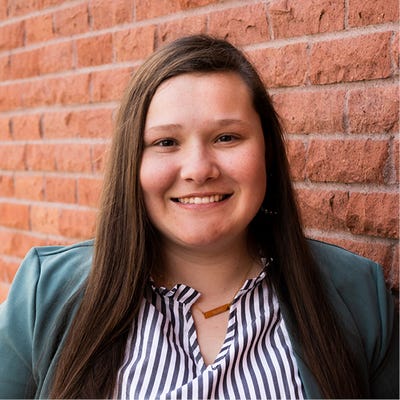
“I do not want to be the generation that lets Grandpa down.”
Many farmers and ranchers across the country have had this thought cross their minds. The beauty of the agricultural industry is that independent producers are often fourth- or fifth-generation farmers and ranchers. But with that, a lot of emotions are tied to the operation.
When times are tough, it can be hard to manage the stresses of the farm. However, at the 2024 Nebraska Farm Bureau Young Farmers and Ranchers Conference held recently in Kearney, Marshal Sewell, a mental health advocate and farmer from Plant City, Fla., shared valuable information on how to help others and keep your mental health in tiptop shape.
Sewell founded “Mind Your Melon,” an organization that prioritizes well-being and mental health for farmers and farm families.
What seeds are you planting?
“He who sows sparingly, reaps sparingly. He who sows bountifully, reaps bountifully,” Sewell said, drawing upon 1 Corinthians 9:6. “How many people do you know are going to go out to the field and halfway grow their crops? How many people that you know that are going go out and check on their calves and only halfway tend to them?”
Sewell encouraged producers to shift their mindset to recognize that our personal lives are not any different.
It pays to perform routine maintenance on farm equipment when needed, rather than a large repair when the machinery gives out.
“So why are our personal lives any different?” Sewell asked.
One of the biggest excuses that Sewell hears from producers when it comes to taking care of their mental health is that they do not have the time. Farmers and ranchers are busy, but he encouraged producers to carve out some time in their day for themselves.
For Sewell, it’s important to take time in the morning before anyone else is up in the house. In this time, he will do anything from doing a quick workout to reading scripture or even just enjoying a cup of coffee.
This solution is not a one size fits all. Whatever helps you slow down and get your mind right before you start the day is important to incorporate into your daily routine.
“This will spill over into the other areas of your life throughout the day as well,” Sewell said.
One 'slice' at a time
“How do you take really big, tough, complex topics and make them palatable?” Sewell asked.
Using a metaphor from Mind Your Melon, he recommended taking on this situation one "slice" at a time. If you know someone who is dealing with something big, this acronym that Sewell came up with can help you help others, one SLICE at a time:
Size up the situation. Before going into the conversation, make sure to come in with no previous assumptions. This will allow you to understand if you are the person that can help them, or in more serious cases, they need a professional to assist them.
Listen actively. When someone comes to you with a tough topic that they are dealing with, they do not want you to fix their problem most of the time. If they are willing to share, sit down with them and be the person they can come to.
Inform and support. Being the person that can actively listen to them will allow you to inform and support them. Letting them know that there is hope and they are not alone can help immensely.
Connect and encourage. There are many different resources that are available to help people deal with tough topics. Being able to connect them with resources such as the ones provided by the Nebraska Farm Bureau (nefb.org/rural-stress) can be a great tool.
Explore resources. Be willing to help people if they might need more. Whether it's agronomic, financial or if it truly is counseling, knowing that they have someone supporting them is important.
Hardiness and resilience
Farmers and ranchers want whatever they are growing to have hardiness and resilience. Taking this ideology into your personal life can make a difference when those tough times come up on the farm or ranch.
“Hardiness is about managing your three Cs in your day-to-day life,” Sewell said. “Looking at the challenge and then controlling the aspects.”
Here are the three Cs:
Challenge. It is important to look at change or adversity as a positive learning opportunity and being open to new experiences.
Commitment. Being able to have a sense of purpose or how you contribute value in all areas of your life can help you build your hardiness and resilience.
Control. Believing in your own ability to control the situation and the outcomes, or at least some of the variables involved, can help you better face these challenges when they come up.
Having this farm state of mind can help you and your neighbors with the ongoing farm stresses that come with this way of life. Knowing who your people are that you can go to and talk about what is going on can be crucial when dealing with your mental health.
For more resources or to learn more from Sewell, check out his website at mindyourmelon.org.
Read more about:
Rural HealthAbout the Author(s)
You May Also Like






